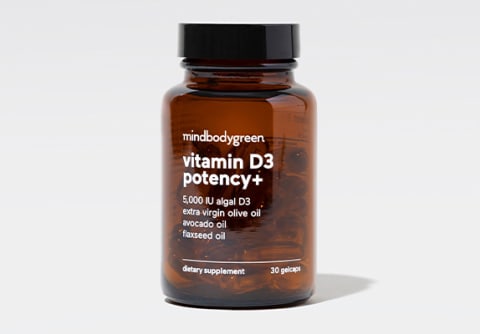Advertisement
This ad is displayed using third party content and we do not control its accessibility features.

Registered Dietitian Nutritionist
Registered Dietitian Nutritionist
Molly Knudsen, M.S., RDN is a Registered Dietician Nutritionist with a bachelor’s degree in nutrition from Texas Christian University and a master’s in nutrition interventions, communication, and behavior change from Tufts University. She lives in Newport Beach, California, and enjoys connecting people to the food they eat and how it influences health and wellbeing.

Image by Stocksy / Christine-La
July 04, 2024
Rightfully deemed the longevity vitamin, vitamin D is a nutrient that you don’t want to overlook as you get older. Why? Well, the body is less efficient1 at synthesizing vitamin D (from the sun) and utilizing vitamin D with age.
Therefore, the likelihood of falling short of your vitamin D needs is greater.
Studies continually show that low levels of vitamin D are linked to worse health outcomes2 (think chronic diseases and poor mobility), whereas adequate levels help promote a long, healthy life.
Here are seven common concerns of aging that low vitamin D levels contribute to or exacerbate and what you need to know about improving your vitamin D status starting now:
Vitamin D is often most known for its role in bone health, as it’s crucial for calcium absorption and bone metabolism.
Yes, bones undergo a metabolic process where bone tissues are continuously forming and breaking down. But bone metabolism slows, and the rate of new bone production also slows, which can lead to a decrease in bone density and an increased risk of fractures.
For reference, vitamin D deficiency is when blood levels are at or below 20 ng/mL42, and 30 ng/mL42 is considered the upper end of insufficiency (or low vitamin D levels).
Vitamin D is a main player in the body’s immune system. It enhances white blood cell function—helping the body ward off pathogens5. As you age, your body’s natural immune defense starts to decline (even starting in your 20s) in a process called immunosenescence6.
Overall, this impacts how quickly your body can respond to infections or illnesses or heal from an injury.
Inflammation is also an important part of the immune response, and vitamin D helps decrease inflammation when it’s no longer needed. However, low vitamin D levels not only hurt the body’s ability to resolve inflammation but can also increase pro-inflammatory cytokines7 (certain types of proteins).
Low vitamin D levels are ultimately linked to a higher risk of inflammatory diseases8—like Type 2 diabetes and cardiovascular disease.
Current research shows that low vitamin D levels can put you at greater risk of developing heart disease and high blood pressure.
Getting enough vitamin D may support heart health by helping cardiac muscle function9 and promoting healthy lipid and cholesterol levels.
There is evidence that links vitamin D status to cancer. While there’s not enough research to confidently say optimal vitamin D levels are protective of cancer, low levels may increase your risk of certain cancers (including breast cancer).
Researchers of a 2015 study found that women who were deficient in vitamin D had a 27% higher risk10 of breast cancer than those with sufficient vitamin D levels.
Researchers believe this association has to do with vitamin D receptor genes11 and their function in mammary glands.
Vitamin D influences cognition as well as mood—as it’s involved in the synthesis of the “feel good” hormone serotonin.
Researchers of a 2023 sweeping meta-analysis found that study participants (on average 50 years of age) with low vitamin D levels were 60% more likely to develop depression14 compared to those with normal levels.
Vitamin D also impacts blood sugar control. Low levels of vitamin D may contribute to insulin resistance (and therefore Type 2 diabetes down the road).
Whereas healthy vitamin D levels promote insulin sensitivity15 and the body’s ability to efficiently handle increases in blood sugar. Some clinical trials show that vitamin D supplements are beneficial in improving blood sugar balance, especially for those with a low vitamin D status to begin with.
Now, some studies have linked low vitamin D levels to mortality. A study published in JAMA Internal Medicine found that people with really low vitamin D (blood levels of less than 17.8 ng/mL to be exact) had a 26% higher risk of all-cause mortality16.
In addition, vitamin D is known to influence all 12 hallmarks of aging—key characteristics at the cellular level that affect aging. So, optimizing your vitamin D status may optimize all aspects of aging.
How to get and maintain optimal vitamin D levels
And it’s nearly impossible to get enough vitamin D from food or sunshine alone—especially as your ability to synthesize vitamin D from the sun declines. A smart solution is to add a high-quality vitamin D supplement to your routine.
The takeaway
Vitamin D has truly earned its title as the longevity vitamin. This vitamin has far-reaching effects—low levels can snowball into a slew of health concerns whereas optimal levels set you up for success.
As vitamin D levels are notoriously hard to maintain—especially as you get older—definitely consider adding a daily vitamin D supplement to your routine.

